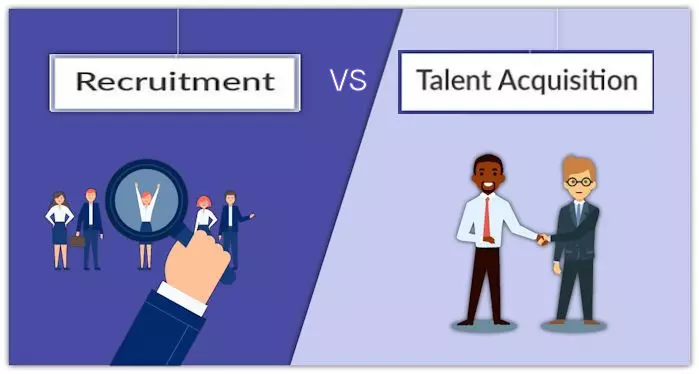The terms talent acquisition and recruitment often get used interchangeably. They share a similar goal – hiring the best person for the job but differ in their approach. The main difference between recruitment and talent acquisition is short-term vs long-term planning. Recruitment starts and finishes by screening and hiring qualified job candidates, while talent acquisition is a long-term strategic process for identifying future staffing needs.
What Is Talent Acquisition?
Talent acquisition shares a few characteristics with recruitment in the sense that it is a strategy for finding top talent to work for your company. However, a talent acquisition strategy involves creating a long-term strategy and planning for your company. It involves a dynamic approach and learning about the future strategic goals of your company.
Talent acquisition teams are focused on digging deeper and understanding future staffing needs, especially for leadership positions and candidates with unique skills. Having a good talent acquisition strategy means that everyone on the human resources team needs to be clear on the company’s long-term goals and align the strategy with their findings and understandings.
What Is Recruitment?
Recruitment is the process of sourcing, evaluating, hiring and onboarding potential candidates for vacant positions. It often follows a pre-defined process that is standardised and implemented in times of expansion or frequent staff turnover. Recruitment is an essential process when running a company but is a short-term process that only seeks to fill a company’s immediate needs.
Talent Acquisition vs Recruitment
Recruitment is a tactical strategy to solve an immediate situation. On the other hand, talent acquisition relies on long-term needs and goals and involves making a company attractive to attract qualified candidates in the future. Here are their key differences compared:
Recruitment:
- A linear process with a specific goal
- Seeks to source, select and hire candidates to fill in job openings
- Reactive process
- Relies on strategies to source specific candidates via job ads
- It is used in any industry and for any role
Talent Acquisition
- Develops long-term strategies to manage future staffing needs
- Proactive process
- A long-term, ongoing process
- Uses strategies like employer branding and emerging technologies to support other strategies
- It is mainly used for hard-to-fill jobs in specific industries with talent shortages
Both recruitment and talent acquisition are strategies that HR professionals use and are essential for successful talent management.

Which One Is More Important?
Talent acquisition, on the other hand, is more than recruiting employees for an open job position. It involves learning and understanding your current staffing needs and using that information to hire candidates. Talent acquisition strategies benefit companies seeking highly qualified staff because they see hiring as an investment. An effective strategy brings more flexibility to the company, but recruitment is sometimes the only position you can use to scale your business.
Knowing your staffing needs and how your business operates is essential to know which strategy will be best. At Olive Recruit, we are a permanent staffing solutions partner and understand the importance of recruiting and talent acquisition strategies to align top talent with business needs.
Talent Acquisition or Recruitment?
Talent acquisition goes beyond the simple sourcing and hiring process approach of recruitment. Learning how to implement the right strategy is all about understanding the real value your employees bring.
Once you start hiring, you are investing in talent, and both strategies prove beneficial depending on the company’s needs. Recruitment plays a crucial role in filling a job opening, no matter the industry. But, talent acquisition is more than a strategy; in the long term, it is to face the most difficult challenges of the changing and evolving job market and tackle other priorities such as expanding, reducing turnover and preparing to meet future challenges.
When Do You Need Talent Acquisition?
Companies need an effective talent acquisition strategy in industries that often have hard-to-fill, complex roles and are in scarce supply. Leaders in these companies should consider developing a talent acquisition strategy and a proactive approach to creating a talent pipeline. With talent acquisition and its proactive, long-term approach, companies prioritise adapting to hiring talent challenges.
When Do You Need Recruitment?
The recruitment process is more straightforward and helps a company evaluate its present and future staffing needs. It uses a systematic approach to company operations to conclude the number of new employees needed. The process ensures that the daily activities in the company will be carried out seamlessly.
Recruitment involves selecting talent from a diverse pool that can meet company needs. It focuses on lowering the costs and time spent looking for potential employees. It is a systematic and organised hiring process where a large number of people will get a well-described job opening. The job description is the critical element that will attract the right talent for the right job at a lower cost.
Conclusion
Employers implementing recruiting and talent acquisition know these processes are not only about evaluating candidates to determine their fit. It is also about building relationships and creating success based on empathy, understanding and collaboration.
It may be challenging to decide whether your company needs a talent acquisition or recruitment strategy; both strategies aim to ensure your company is successful. However, if you need help in implementing these strategies or you need help in finding the right job position for you, contact our team at Olive Recruit today and see how we can help.